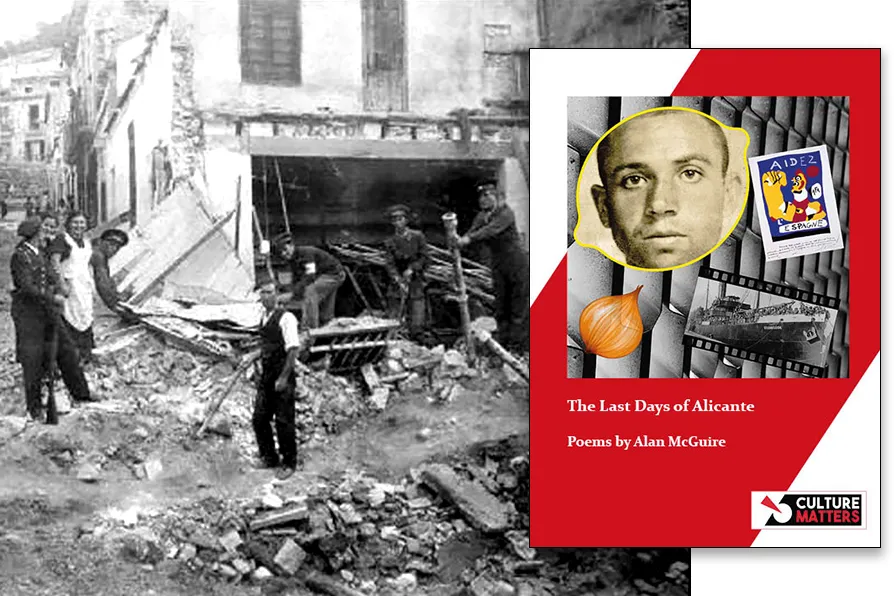DENNIS BROE searches the literary canon to explore why a duplicitous, lying, cheating, conning US businessman is accepted as Scammer-in-Chief
RUTH AYLETT relishes poetry that explores the historical echoes to be heard in Alicante, last refuge of the Spanish Republican government

 FASCIST CRIME: Damage caused by the bombing of Alicante May 25 1938 by Italian aircraft, allied to Franco. One of the most deadly crimes against civilians, it caused between 250 and 300 deaths and around 1,000 casualties
[Public Domain]
FASCIST CRIME: Damage caused by the bombing of Alicante May 25 1938 by Italian aircraft, allied to Franco. One of the most deadly crimes against civilians, it caused between 250 and 300 deaths and around 1,000 casualties
[Public Domain]
The Last Days of Alicante
Alan McGuire, Culture Matters, £8
ALICANTE was the final refuge of the pre-war Spanish Republican government, and McGuire says that this pamphlet is intended to highlight its final days, and also to pay tribute to a working-class socialist poet of those days, Miguel Hernandez. Hernandez fought in the civil war with the Fifth Regiment of the Spanish Communist Party, was imprisoned after the fall of the Republic, and died in prison of TB in 1942.
That said, this is neither a chronicle of the last days of the Republic, nor entirely a tribute to Hernandez, though both figure in some pieces. Fran Locke’s Introduction is informative on Hernandez, and makes one want to see some of his work in translation. The short piece Fig Tree references him, though the accompanying picture is needed to appreciate that; Spectator, referencing bull fights, is directly inspired by one of his pieces, Like the Bull, Born to Sorrow; and Miguel’s Tomb is self-explanatory.
Alicante was the site of a fascist atrocity when its Market was bombed without any warning, and this appears in Mercado Central: “fans waving on terraces/ children play in the plaza/ suitcases roll to the town’s pavement/ where bodies once lay.”
In Philosopher’s Shelter, McGuire imagines the population sitting in a square named after the philosopher Seneca: “wondering when the sirens will stop/ if their house will be standing/ if their parents made it/ to the other shelter/ guilt shakes their bones”.
The Last Days of Alicante is a narrative of the final evacuation in which a Cardiff-based steamer took on 2,800 people just before the final fascist assault: “as they drifted away from Alicante/ the bombs began to drop, the worst he’d seen,” though for me it is as if the magnitude of the event almost forces the poet to drop into prose.
The pamphlet includes other poems about life in the city. In The Virgin of Benidorm, small-boy divers discover a box in the burned wreckage of a ship “porcelain doll of mary/ untouched by flames/ holds Jesus in her arms/ while Benidorm prays”.
Barrio documents decline: “plazas emptying of people/ voices echo for decades/ same demands, new airs and graces/ control lost over life/ take back control/ the populist line/ angry men buy it”.
The pamphlet also includes some personal pieces: We; The World looks at the experience of walking by the sea: “we walk on the coast/ her siren song speaks/ we both hear something/ hands clench firm/ we sigh harmoniously/ as we join the sand and sea.”
This is a set of accessible poems and the poet goes for plain language and short lines in most of them. McGuire has settled in Alicante after living in Britain, and this is a good way to understand what it might be like, a million miles from the usual expats-in-the sun.
The last days of Alicante is published by Culture Matters









